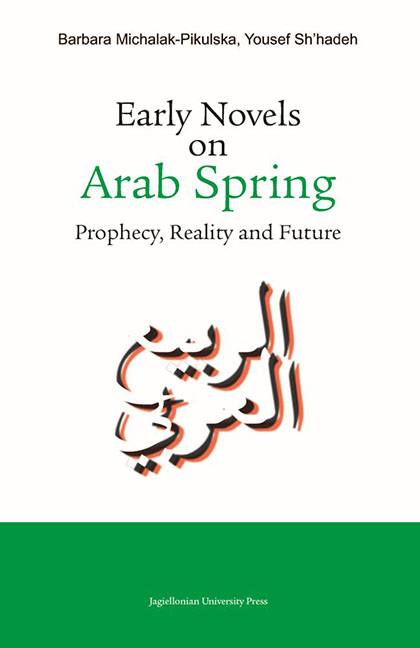Book contents
- Frontmatter
- Contents
- Introduction
- Part I Awakening of the Awareness of Subjugation – The Prophecy of the Spring of Nations in Arab Novels
- Part II At the Heart of the Arab Spring Events
- Part III The Future: The Spring Continues
- 17 Mu‘Taṣim Aš - Šā‘Ir : Uhzūǧat ar-raḥīl (A Song of Departure) and Fī intiẓār as-sulaḥfāt (Waiting for a Turtle)
- 18 Aḥmad ‘Abd Al - Malik : Al-Aqni‘a (Masks)
- 19 Ṭayba Aš - Šarīf Al - Idrīsī : Ḥaǧar min saqar (A Stone from Hell)
- 20 Amīra Aš - Širbīnī : ‘Itq (Liberation)
- 21 ‘ Izz Ad - Dīn Šukrī Fašīr : Bāb al-ẖurūǧ – risālat ‘Alī al-muf‘ama bi-bahǧa ġayr mutawaqqa‘a (The Gate to Leave – Ali’s Letter Filled with Unexpected Joy)
- Conclusion
- Bibliography
- Summary in Arabic
21 - ‘ Izz Ad - Dīn Šukrī Fašīr : Bāb al-ẖurūǧ – risālat ‘Alī al-muf‘ama bi-bahǧa ġayr mutawaqqa‘a (The Gate to Leave – Ali’s Letter Filled with Unexpected Joy)
Published online by Cambridge University Press: 13 October 2023
- Frontmatter
- Contents
- Introduction
- Part I Awakening of the Awareness of Subjugation – The Prophecy of the Spring of Nations in Arab Novels
- Part II At the Heart of the Arab Spring Events
- Part III The Future: The Spring Continues
- 17 Mu‘Taṣim Aš - Šā‘Ir : Uhzūǧat ar-raḥīl (A Song of Departure) and Fī intiẓār as-sulaḥfāt (Waiting for a Turtle)
- 18 Aḥmad ‘Abd Al - Malik : Al-Aqni‘a (Masks)
- 19 Ṭayba Aš - Šarīf Al - Idrīsī : Ḥaǧar min saqar (A Stone from Hell)
- 20 Amīra Aš - Širbīnī : ‘Itq (Liberation)
- 21 ‘ Izz Ad - Dīn Šukrī Fašīr : Bāb al-ẖurūǧ – risālat ‘Alī al-muf‘ama bi-bahǧa ġayr mutawaqqa‘a (The Gate to Leave – Ali’s Letter Filled with Unexpected Joy)
- Conclusion
- Bibliography
- Summary in Arabic
Summary
Since the dawn of time, there have been individuals who have been able to do a lot of harm to the general public and showed no inhibitions in doing so. The role of history and literature was to stigmatize such attitudes and keep them in memory for future generations, as a cautionary tale. There are many such wrongdoers also today and the Arabs have started to rebel against them. They do not want to accept their rule and the revolution in Egypt was a manifestation of this. Nonetheless, instead of order and improvement of the system there is further political struggle.
‘Izz ad-Dīn Šukrī Fašīr in the novel Bāb al-ẖurūǧ – risālat ‘Alī al-muf‘ama bi-bahǧa ġayr mutawaqqa‘a (The Gate to Leave – Ali’s Letter Filled with Unexpected Joy) tells about the situation in Egypt after the revolution on January 25, 2011. The author describes fictitious events that are to take place in the country on the Nile before 2020, as a direct result of revolutionary activities. The novel is a work of a political and social nature and its author thoroughly analyzes the events that contributed to the Arab Spring in Egypt, showing the struggle for power between various political options. He sees, in the events that are taking place, the enormous role of the army, which ultimately seizes power by pushing political parties aside. The author builds characters in a very convincing way, and the narrative runs rapidly. The main character is ‘Alī, who works as a translator in the presidential palace during the Mubarak regime. After the outbreak of the revolution, he is pro moted to the secretary of the president, who is his father-in-law, and thus participates in the presidential council. The novel, from the first to the last page, is epistolary and is based on the letter that the main character writes to his son – Yaḥyā.
The storyline begins in 2020, when the main character starts writing the letter. He reports to his son about many matters of greatest importance. He must complete his letter within twenty-four hours, before a dangerous event occurs, which could change the fate of the entire Middle East and even the world.
- Type
- Chapter
- Information
- Early Novels on Arab SpringProphecy, Reality and Future, pp. 148 - 156Publisher: Jagiellonian University PressPrint publication year: 2022



